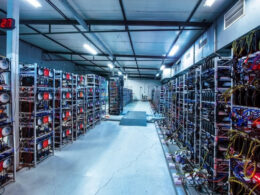Paul Zalai, Director of the Australian Freight & Trade Alliance (FTA), recently discussed the possibility of a future partnership with San Francisco-based fintech firm Ripple. This development comes at a crucial time for Ripple, as it expands its global presence after a favorable outcome in its legal battle with the US Securities and Exchange Commission (SEC).
The Australian Freight & Trade Alliance is a prominent player in Australia’s international supply chain sector, which makes this potential partnership worth noting. While Paul Zalai acknowledged his limited understanding of blockchain technology, he revealed that his son, who is more knowledgeable about cryptocurrencies, has invested in Ripple’s digital asset XRP.
“All this blockchain stuff, I don’t get it. I admit it. But I am trying to understand. My 32-year-old son, who is a bit more savvy to all this stuff, bought some shares in Ripple, and he doesn’t gamble with his money easily,” Zalai said.
Zalai explained that Ripple initially approached the FTA while facing its legal battle with the SEC. At that time, the FTA declined any discussions and advised Ripple to return once the regulatory environment had clarified.
“I am not an expert on blockchain, but I understand that Ripple approached us some time ago, but at the time they were fighting a legal battle in the US. And our position to them was, come back once that is sorted out,” Zalai commented.
The Australian Freight & Trade Alliance represents various stakeholders in the international supply chain sector, from importers to logistics service providers. Its mission is to enhance profitability for Australia’s trade entities and achieve maximum efficiency in biosecurity and logistics.
Despite its past legal challenges, Ripple has been gaining momentum. The company recently obtained a full license to offer digital payment services in Singapore, signaling its intention to diversify and grow. Zalai praised Ripple’s technology and confirmed that major banks in Australia have shown significant interest in it.
“From what I can understand, they can generate real-time cross-border payments, and they seem to have a lot of checks and balances in place. At the briefing, where I was at, there were a lot of representatives from major banks that were very interested in it,” he said.
Zalai disclosed that the FTA would review Ripple’s offerings and consider promoting their product to FTA members. Although the partnership is still in the discussion stage, Zalai shared insights into the next steps.
“The group [from Ripple] came down and presented at the Waterfront of Sydney Harbour. They were all Singapore-based. We will follow back with them. I think we will first do some information sessions. But we will let them engage with our members, and our members can ask questions, and then we’ll see where that goes,” Zalai elaborated.
The initial talks between Ripple and the Australian Freight & Trade Alliance raise the possibility of a significant transformation in how payments and settlements are managed in the freight and trade industry. The conventional methods often involve complex chains of transactions, relying on intermediaries like banks and financial institutions. These processes are not only cumbersome but also time-consuming and costly, often incurring fees and delays.
Ripple’s blockchain-based payment solutions offer the promise of real-time cross-border transactions, circumventing the need for intermediaries. If Ripple and FTA were to formalize this partnership, it could serve as a case study for eliminating inefficiencies in the current system.
The fintech firm’s technology has the potential to provide a streamlined and cost-effective approach to executing international transactions, which is particularly relevant given the FTA’s role in Australia’s international supply chain. Established industry players, especially financial institutions facilitating international trade payments, may find themselves at a crossroads. They will need to adapt to this new model of instantaneous, blockchain-based transactions or risk losing competitiveness.
For these traditional players, the potential partnership between Ripple and FTA could act as a catalyst, driving them to modernize their systems and even explore blockchain solutions of their own.














